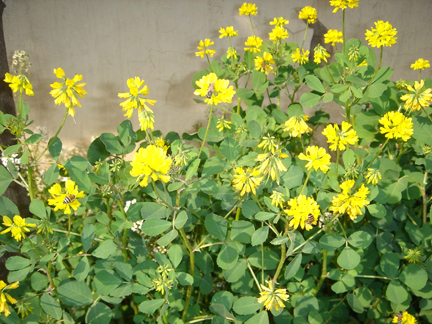Bee- friendly gardens
20th August, World Honey Bee Day, was just another day for us Indians, we hardly cared. World Honey Bee Day, is an idea put together by beekeepers in the USA, who petitioned the USDA in 2009 for an official day to honour honey bees and beekeeping. A few years
down the line, people across the globe are holding a date of observation every year on August 20th. The observation of World Honey Bee Day signifies the growing awareness of the challenges brought about by declining bee populations across the world. Bees
are of great importance in sustaining bio diversity and food security.
Honey Bee on Bottle gourd flower
A honey bee is primarily distinguished by the production and storage of honey and the construction of perennial, colonial nests from wax. Solitary bees are important pollinators, and pollen is gathered for provisioning the nest with food for their brood.
Often it is mixed with nectar to form a paste-like consistency. Some solitary bees have very advanced types of pollen-carrying structures on their bodies. A very few species of solitary bees are being increasingly cultured for commercial pollination.
In June 2015, President Obama of the USA, issued a Presidential Memorandum directing an interagency Task Force to create a Strategy to Promote the Health of Honey Bees and Other Pollinators.
According to the 2015 White House (USA)notification announcing steps to promote pollinator health,
"Pollinators are critical to the Nation’s economy, food security, and environmental health. Honey bee pollination alone adds more than $15 billion in value to agricultural crops each year, and helps ensure that our diets include ample fruits, nuts, and
vegetables. This tremendously valuable service is provided to society by honey bees, native bees and other insect pollinators, birds, and bats.
But pollinators are struggling. Last year, beekeepers reported losing about 40% of honey bee colonies, threatening the viability of their livelihoods and the essential pollination services their bees provide to agriculture. Monarch butterflies, too, are
in jeopardy. The number of overwintering Monarchs in Mexico’s forests has declined by 90% or more over the past two decades, placing the iconic annual North American Monarch migration at risk.
The President has emphasized the need for an “all hands on deck” approach to promoting pollinator health, including engagement of citizens and communities and the forging of public-private partnerships. To foster collaboration, the interagency Pollinator
Health Task Force will work toward developing a Partnership Action Plan that guides coordination with the many state, local, industry, and citizen groups with interests in and capacities to help tackle the challenge facing pollinators.
People of all ages and communities across the country can play a role in responding to the President’s call to action. YOU can share some land with pollinators—bees, butterflies, other insects, birds, bats—by planting a pollinator garden or setting aside
some natural habitat. YOU can think carefully before applying any pesticides and always follow the label instructions. YOU can find out more about the pollinator species that live near you."

Honey bees on 'Methi' flowers
In India, our gardens can support many different objectives. They can support healthy lives for nature’s pollinators, primarily bees and butterflies. The development of fruits and vegetables, which are essentially seed cases, often depends on bees, and
butterflies are important pollinators of wild and cultivated flowers.
Our pollinators are threatened by civilization, notably habitat loss and agricultural chemicals. A pollinator-friendly garden has direct benefits for the bees and butterflies, and serves the gardener with the pleasure of beautiful surroundings and the
satisfaction of ecologically sound practices. Also, an enjoyable and educational counterpart to bird-watching is the emerging activity of bee-watching. There is much to learn from the bees!
Here are the names of some plants and their pollinators
Plant name Pollinators
Okra (Bhindi) Honey bees, Solitary Bees
Onion Honey bees, Solitary Bees
Mustard Honey bees, Solitary Bees
Coriander Honey bees, Solitary Bees
Broccoli Honey bees, Solitary Bees
Cauliflower Honey bees, Solitary Bees
Cabbage Honey bees, Solitary Bees
Carrot Honey bees, Solitary Bees, Flies
Eggplant Bumblebees, Honey bees
Tomato Bumblebees, Solitary bees
Chillies Honey bees, Solitary Bees, Hover flies, stingless bees
Papaya Honey bees, Moths, Butterflies
Lemon Honey bees
Lime Honey bees
Mango Honey bees, Stingless bees, Flies, Ants, Wasps
Guava Honey bees, Stingless bees, Solitary Bees, Bumble bees
Pomegranate Honey bees, Solitary Bees, Beetles
BottleGourd Honey bees, Solitary Bees, Beetles